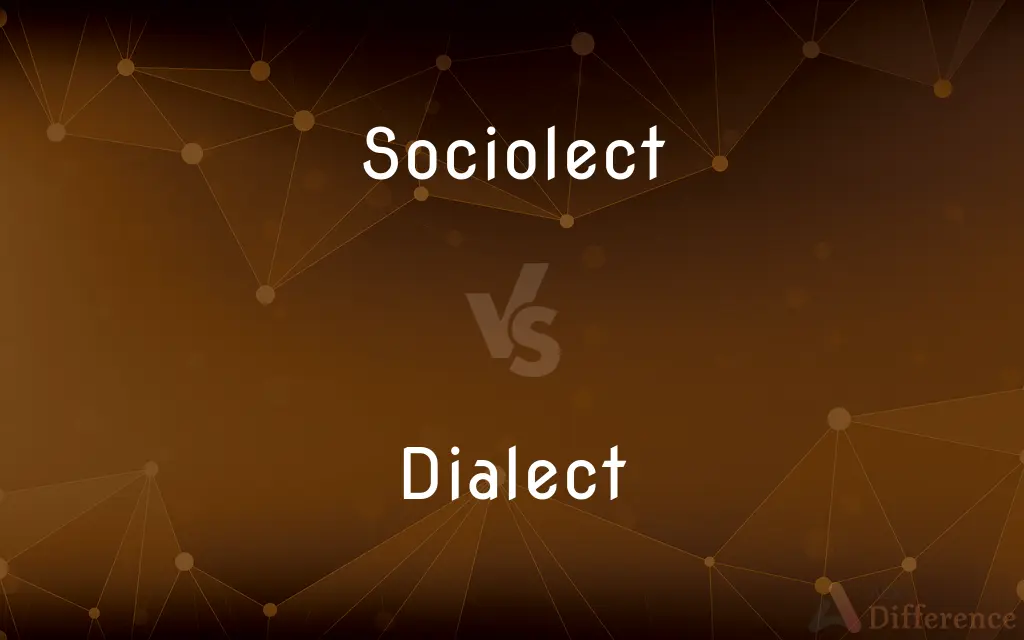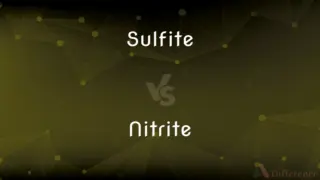Sociolect vs. Dialect — What's the Difference?

Difference Between Sociolect and Dialect
ADVERTISEMENT
Compare with Definitions
Sociolect
In sociolinguistics, a sociolect is a form of language (non-standard dialect, restricted register) or a set of lexical items used by a socioeconomic class, a profession, an age group or other social group.Sociolects involve both passive acquisition of particular communicative practices through association with a local community, as well as active learning and choice among speech or writing forms to demonstrate identification with particular groups. The term sociolect might refer to socially-restricted dialects, but it is sometimes also treated as equivalent with the concept of register, or used as a synonym for jargon and slang.Individuals who study sociolects are called sociolinguists.
Dialect
The term dialect (from Latin dialectus, dialectos, from the Ancient Greek word διάλεκτος, diálektos 'discourse', from διά, diá 'through' and λέγω, légō 'I speak') can refer to either of two distinctly different types of linguistic phenomena: a variety of a language that is characteristic of a particular group of the language's speakers. Under this definition, the dialects or varieties of a particular language are closely related and are often mutually intelligible, especially if close to one another on the dialect continuum.
Sociolect
(sociolinguistics) The variant of language used by a social group such as a socioeconomic class, an ethnic group, an age group, etc.
Dialect
A particular form of a language which is peculiar to a specific region or social group
The Lancashire dialect seemed like a foreign language
Dialect
A regional or social variety of a language distinguished by pronunciation, grammar, or vocabulary, especially a variety of speech differing from the standard literary language or speech pattern of the culture in which it exists
Cockney is a dialect of English.
ADVERTISEMENT
Dialect
A variety of language that with other varieties constitutes a single language of which no single variety is standard
The dialects of Ancient Greek.
Dialect
The language peculiar to the members of a group, especially in an occupation; jargon
The dialect of science.
Dialect
The manner or style of expressing oneself in language or the arts.
Dialect
A language considered as part of a larger family of languages or a linguistic branch. Not in scientific use
Spanish and French are Romance dialects.
Dialect
A lect (often a regional or minority language) as part of a group or family of languages, especially if they are viewed as a single language, or if contrasted with a standardized idiom that is considered the 'true' form of the language (for example, Cantonese as contrasted with Mandarin Chinese or Bavarian as contrasted with Standard German).
Dialect
A variety of a language that is characteristic of a particular area, community, or social group, differing from other varieties of the same language in relatively minor ways as regards grammar, phonology, and lexicon.
Dialect
(pejorative) Language that is perceived as substandard or wrong.
Dialect
A language existing only in an oral or non-standardized form, especially a language spoken in a developing country or an isolated region.
Dialect
A variant of a non-standardized programming language.
Home computers in the 1980s had many incompatible dialects of BASIC.
Dialect
(ornithology) A variant form of the vocalizations of a bird species restricted to a certain area or population.
Dialect
Means or mode of expressing thoughts; language; tongue; form of speech.
This book is writ in such a dialectAs may the minds of listless men affect.Bunyan.The universal dialect of the world.
Dialect
The form of speech of a limited region or people, as distinguished from ether forms nearly related to it; a variety or subdivision of a language; speech characterized by local peculiarities or specific circumstances; as, the Ionic and Attic were dialects of Greece; the Yorkshire dialect; the dialect of the learned.
In the midst of this Babel of dialects there suddenly appeared a standard English language.
[Charles V.] could address his subjects from every quarter in their native dialect.
Dialect
The usage or vocabulary that is characteristic of a specific group of people;
The immigrants spoke an odd dialect of English
He has a strong German accent
Share Your Discovery

Previous Comparison
Sulfite vs. Nitrite
Next Comparison
Rock vs. Brick













































